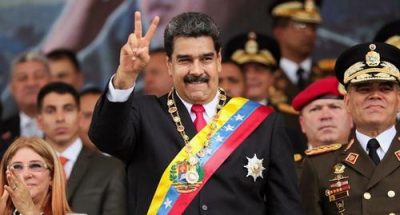Venezuela Ditches US Dollar, Will Use Euros for International Trade

Venezuela has just taken the next step in its quest to “free” itself from the tyranny of US dollar hegemony. One year after the country said it would stop accepting US dollars as payment for its (ever shrinking) oil exports (saying the country’s state-run oil company would accept payment in yuan instead), Venezuelan Vice President for Economy Tareck El Aissami said Tuesday that Venezuela will officially purge the dollar from its exchange market in favor of euros.
While we’re sure that Venezuelan President Nicolas Maduro would love to frame this as his latest gesture of defiance against tyrannical imperialist overreach by Washington, which he has blamed for aggravating the country’s humanitarian crisis by waging an “economic war” against the oil-rich nation, remember that the US effectively blocked the Venezuelan government from transacting in dollars last year when it imposed restrictive sanctions on the Maduro regime and the country’s state-run oil company, PDVSA. Maduro started the process of moving the country’s DICOM system of official tiered exchange rates in September 2017 when he declared that Venezuela would use a “new system of international payments.”
“Venezuela is going to implement a new system of international payments and will create a basket of currencies to free us from the dollar,” Maduro said in an hours-long address to a new legislative superbody, without providing details of the new mechanism.
“If they pursue us with the dollar, we’ll use the Russian ruble, the yuan, yen, the Indian rupee, the euro,” Maduro declared.
The sanctions have largely excluded Venezuela from international capital markets and the US dollar-based financial system, forcing Maduro’s regime to rely on money-for-oil loans extended by China.
Maduro and many senior members of his government have been personally singled out for sanctions by the Treasury Department, a punishment that Maduro has called “an honor.”
To help seed the Venezuelan financial system with euros, the country’s cash-strapped central bank is planning to auction 2 billion euros some time between November and December.
The American “financial blockade” of Venezuela affects both the country’s public and private sectors, including pharmacy and agriculture, and shows “just how far the imperialism can go in its madness,” the vice president said.
Venezuela’s floating exchange rate system, Dicom, “will be operating in euro, yuan or any other convertible currency and will allow the foreign exchange market to use any other convertible currency,” El Aissami said.
The vice president added that all private banks in Venezuela are obliged to participate in the Dicom bidding system.
Even if it’s insignificant relative to Russia and China’s plans to create an alternative global financial system based on rubles and the yuan, this move is one more blow against US dollar hegemony, and one more step into the open arms of China, which has helped keep Maduro’s teetering regime afloat in the face of an assassination attempt and an aborted US-backed coup.
*
Note to readers: please click the share buttons above. Forward this article to your email lists. Crosspost on your blog site, internet forums. etc.
Featured image is from Zero Hedge.

